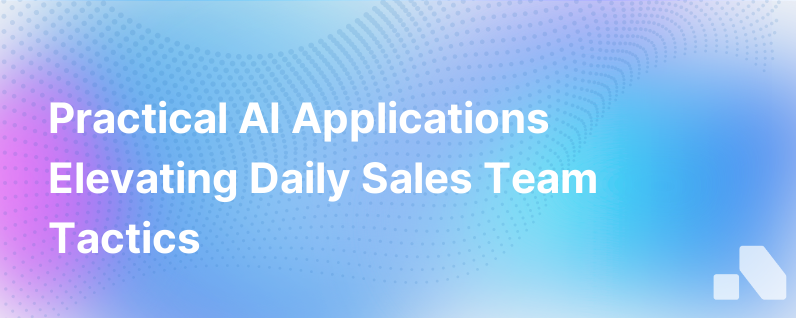
The integration of Artificial Intelligence (AI) into the realm of sales is reinventing how sales teams operate by simplifying processes, personalizing customer interactions, and enhancing decision-making with predictive analytics. AI has stepped out of the sphere of science fiction and high-end technology applications, embedding itself into practical tools that optimize the everyday selling experience. Let’s unravel the practicality of AI applications in sales and how they are changing the game for sales teams across the board.
AI-Powered Prospecting and Sales Intelligence
In the initial stages of the sales process, prospects must be carefully chosen and approached through an informed understanding of their needs and potential. Advanced analytics combined with AI algorithms can sift through vast amounts of data, identifying patterns and offering predictive insights.
Prospecting Optimization
AI can analyze historical sales data, market trends, and customer profiles to recommend the most promising leads. "Lookalike" modeling can also be applied – an AI-driven tactic that finds new prospects based on the characteristics of existing successful clients. This dramatically reduces time spent on lead qualification and enhances the focus on high-potential prospects.
Real-Time Sales Intelligence
During customer engagements, AI systems like chatbots provide real-time sales intelligence, pulling up relevant customer information and history. They serve as digital assistants guiding sales reps by giving them access to prior interactions, preferences, and purchase history, allowing for a more informed conversation.
Personalization at Scale
Personalizing the buyer's journey is integral for sales conversions, but achieving this manually is a Herculean task. AI steps in to make personalization scalable.
AI-Enhanced Communication
AI-driven tools can generate personalized emails by analyzing customer data and tailoring messages to mirror the prospect’s language preferences, interests, and purchase behaviors. They can even recommend the best times to send these messages to maximize open and response rates.
Product Recommendations
Once integrated into CRM systems, AI can leverage existing data to suggest products or services that align with specific customer requirements or have been popular among similar profiles. This is akin to the "Customers who bought this item also bought…" strategy used by e-commerce platforms, applied meticulously in a B2B context.
Improved Forecasting
Sales forecasting traditionally relies heavily on intuition and past performance. AI adds an extra dimension by using machine learning to identify complex patterns and predict future sales trends with higher accuracy.
Predictive Analysis
Utilizing vast datasets that include sales cycles, customer behavior, and even wider economic indicators, AI can make informed predictions about future sales successes or potential risks. These insights enable sales teams to adjust their strategies proactively, focusing their effort where the impact will be greatest.
Pipeline Management
By monitoring the sales pipeline, AI can forecast the likelihood of each deal closing and flag potential issues before they become deal-breakers. This allows sales managers to focus their coaching and resource allocation where it is needed most.
Efficiency in Sales Operations
Repetitive and administrative tasks can often bog down sales reps, stealing time from customer interactions. This is where AI shows its chops in streamlining operations.
Automating Routine Tasks
Routine tasks like inputting data into CRMs, scheduling meetings, or even generating quotes can be automated with AI, allowing sales reps to concentrate on building customer relationships and closing deals.
Intelligent Assistants
AI-based virtual assistants can transcribe meeting notes, remind teams about follow-ups, and even draft responses to frequently asked customer queries. These tools take over mundane tasks, increasing the overall productivity of the team.
Enhanced Training and Onboarding
Incorporating AI into sales training augments the learning experience and accelerates the onboarding process for new reps.
Customized Learning Paths
AI can analyze an individual’s performance and customize training modules to address specific weaknesses. For example, if a sales rep struggles with closing, AI might suggest specific closing technique training.
Real-time Coaching
AI doesn’t just train—it coaches too. During live sales calls, AI software can offer real-time suggestions for reps, such as talking points, competitive intelligence, and objection handling.
Real-world Application of Aomni
In sales teams equipped with advanced AI tools like Aomni, the realities of these applications are tangible.
Zero Effort Competitive Insights and Personalized Sales Content
With AI like Aomni, sales reps spend less time on research and prep. The platform delivers real-time account research generated within minutes. Sales content is personalized rapidly, informed by actionable competitive insights that Aomni processes in the background.
Shortened Sales Cycle
The predictive capabilities of Aomni's AI can reduce the sales cycle by promptly identifying the most qualified leads and providing the insights necessary to engage them effectively, leading to quicker conversions.
Enhanced Buying Experience
An AI platform like Aomni can redefine the customer buying experience by equipping sales teams with the tools to not only understand customer needs but also predict future requirements, providing an unmatched level of service.
Conclusion
AI applications have permeated the B2B sales arena, evidenced not only by enhanced efficiencies but by deeper client connections and sophisticated predictive insights. The transition isn’t just futuristic—it’s now. Companies leveraging these AI-driven capabilities are experiencing transformative benefits. Those yet to adopt risk trailing in a rapidly evolving selling landscape where AI like Aomni isn’t just an option, but essential for staying competitive.